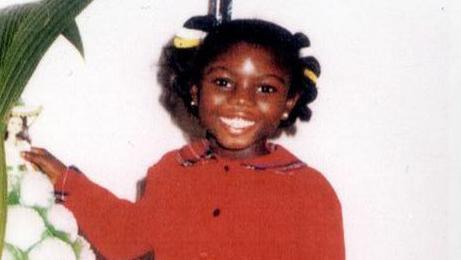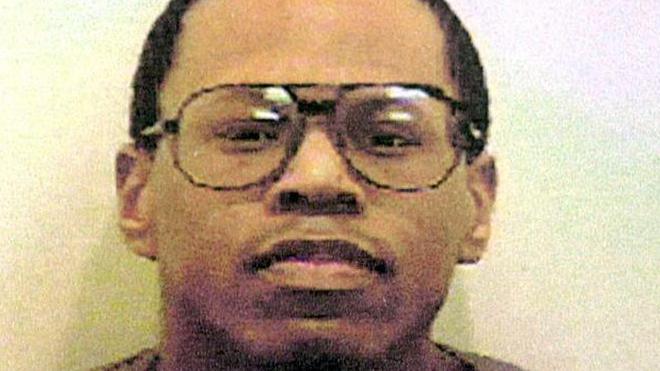Victoria Climbie killer will not be released

Victoria Climbie was murdered by her great aunt and her partner
- Published
Child killer Carl Manning, who took part in the murder of eight-year-old Victoria Climbie, will not be released from prison, the Parole Board has said.
Victoria was tortured to death in 2000 by her great aunt Marie Therese Kouao and her partner Manning in one of Britain's worst child abuse cases.
Manning, now in his 50s, was eligible for parole having been given a minimum 21-year sentence, but following a hearing on 11 September the board made the decision not to release him from jail or to move him to open prison.
In a decision summary, the board said having looked at the evidence it "was not satisfied that release at this point would be safe for the protection of the public".
Victoria had been sent to Europe by her parents who hoped she would gain a better education than in her native Ivory Coast.
But she was starved, beaten with coat hangers and bicycle chains, bound naked and kept prisoner in a freezing bathroom in a flat in Haringey, north London.
When she died in February 2000 she weighed 3st 10lb (23.5kg) and had 128 separate injuries on her body.
Victoria had been seen by dozens of social workers, nurses, doctors and police officers but they failed to spot and stop the abuse.

Carl Manning, who is now in his 50s, will not be released from jail or moved to an open prison
Kouao and Manning claimed Victoria was possessed and were both jailed for life for her murder in 2001 after a trial at the Old Bailey.
Manning was handed a minimum term of 21 years for the murder and eight years for child cruelty to run concurrently.
The latest hearing was his third review for release after the Parole Board refused requests in 2021 and 2023.
The panel heard that Manning "consistently declined" to co-operate with professional assessments in prison, and officials believed there was not enough known about the murderer and what "caused him to behave and think as he did".
'Sadistic element'
The summary added he had completed accredited programmes in prison to address his decision making and use of violence.
The panel added: "The panel noted the cruelty, abuse and neglect suffered by the victim leading to her death.
"It considered the offence to be of the utmost gravity and that there was a sadistic element in addition to extreme punishment.
"In the absence of professional assessments of Mr Manning, the panel concluded that there were too many gaps in the understanding of his risk."
Victoria's death led to a huge public inquiry and a series of safeguarding initiatives, including a national action plan to tackle faith or belief-based child abuse which was launched in 2012.
In 2002, former bus driver Manning gave evidence to the public inquiry and apologised to Victoria's parents for his part in her death.
The inquiry chaired by Lord Laming found there were at least 12 missed chances to save her and made more than 100 recommendations to the government to reform the system.
Manning will be eligible for another parole review in about two years.
Listen to the best of BBC Radio London on Sounds and follow BBC London on Facebook, external, X, external and Instagram, external. Send your story ideas to hello.bbclondon@bbc.co.uk, external